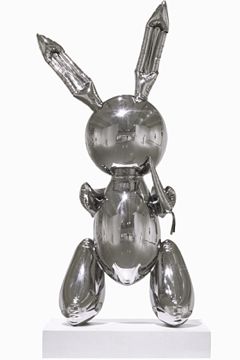Last week I described a few upcoming classes where my high school students were taking on the question of whether or not an idea can be considered a work of art, even if an artist never actually touches the object that’s created or has a direct hand in the performance of the piece. This question led to other questions, such as:
- Does an idea have to be coupled with an action or object for it to be considered art?
- Does conceptual art need a “frame”- a museum, gallery, public art space- to declare it art?
- What is art, if it’s not getting you talking?
This last question led to a dialogue about Tino Sehgal’s recent show at the Guggenheim Museum and many of the the other surrounding questions in our Socratic Seminar. Below is a sampling of quotes from the discussions that took place last week, prior to our visit to the Whitney Museum Biennial where we viewed and discussed a few more conceptual works. What a week!
On whether an idea is art:
As long as you get the idea across, it can be art. As long as it doesn’t simply exist in your head. Tino Sehgal has a finished product. It’s just an idea, it’s not a physical object, but the idea is carried out. – Jon
But in the Sehgal exhibit, the performers are almost carrying out their own form of the idea. – Samantha
Choosing the Guggenheim was a good idea for Sehgal’s work because it became part of the statement- the spiral was part of the work and the conversation. – Matthew
You can’t put an idea in a museum. – Laurette
The idea of a bunny in chrome is a good idea, but talent is involved in getting it to look like a balloon.- Hannah
On conceptual art:
Every person who sees the Sehgal exhibit has a memory of it. People are paying to have this experience in a museum. It wouldn’t mean anything if it happened on the street. – Sally
I really like the idea for the Tino Sehgal exhibit. I don’t know if I’d pay $20 to see it, but I like the idea. – Laurette
On who should receive credit for conceptual works produced by fabricators or performers:
I think the performers should have been credited in the Sehgal show. In ballet, dancers are considered artists even though they don’t actually choreograph the dance. They don’t have the idea. They are the vessel that choreographers use to show the idea to the world. – Suzanne
If an idea is specific and others carry out the instructions, as with Sol Lewitt, then it’s the artist’s work. If there is room for interpretation, then the people who are carrying out the work should also get credit. – Jon
Leaders get credit for the work because they bring people together. – Mia
I think it’s way more concrete when an artist actually makes the work or participates. It takes a lot more talent to actually make it. – Hannah
If artists do their own work, I feel they are more respected. – Julie
In some conceptual work, the idea is so striking that it doesn’t matter who created the work. – Samantha
Involving other people is part of the art. – Julie
On whether conceptual works need a museum or art space to “frame” the work:
Putting something in a museum makes it art. – Olivia
Placing work in a museum is a way of labeling it as art. – Crystal
Conceptual artists need a museum to show off their work. – Camille
On conceptual art, music, and architecture:
Conceptual artists are like composers. They write the music but do not perform it. – Hannah
Art doesn’t have to be a physical object. You have to feel something for it to be art. – Brittany
Who gets credit when a building is completed? Frank Lloyd Wright didn’t get out there with a hammer. But he gets credit because he designed the house. – Matthew
An architect creates the beauty in a house, not the construction workers. – Sally
What surprised me was how quickly students were ready to accept ideas as works of art (with conditions) and how intensely they responded to the readings provided before our seminar. Many thanks everyone who participated in the dialogue! And many thanks in advance to those who may want to comment on the column from here…
COMING UP: Stay tuned to Teaching with Contemporary Art in April where I will be sharing an interview with Laura Thompson, Director of Education and Exhibitions at Mass MoCA’s KidSpace, who just celebrated their 10th anniversary, as well as reports on the National Art Education Association’s annual conference in Baltimore, where Art21 will be presenting a variety of events with Carrie Mae Weems.




